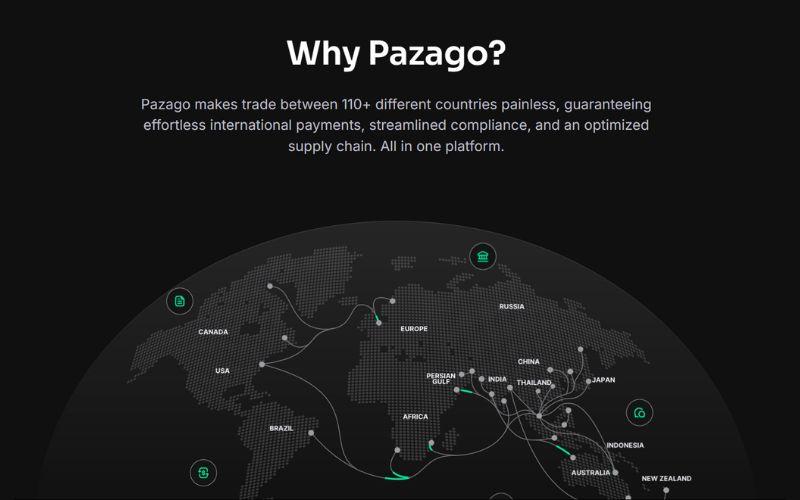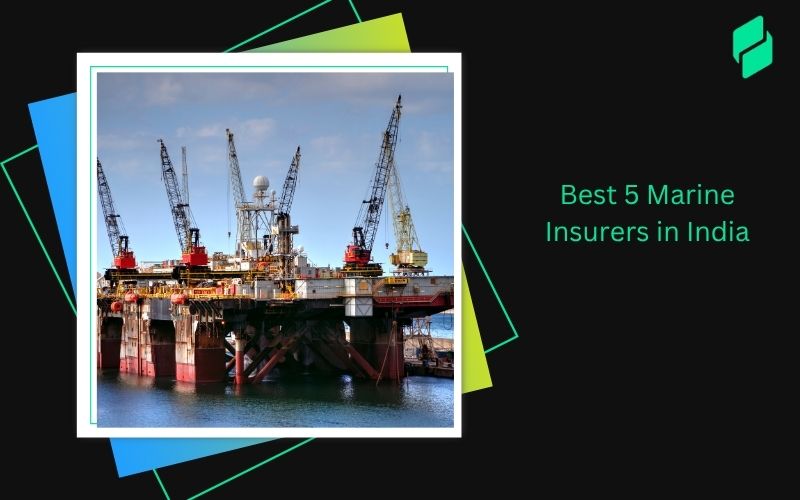Optimize your business: use unlimited savings with Pazago fulfilled now!
Get Started ->Marine insurance is crucial for India's expanding international trade and shipping sectors. As one of the world's largest exporters and importers, India relies heavily on shipping to connect with global markets. In this complex scenario, securing marine policies is critical for minimising risks and safeguarding shipments, ensuring that goods reach their destination safely and on time.
This blog will break down the top 5 marine insurance policy providers in India, covering the most important types of policies available, explaining how they work, and offering guidance on how to make the right choice for your business.
TL;DR
- Financial Protection & Risk Mitigation: Marine insurance protects goods during transit, covering potential losses from damage, theft, or accidents, helping businesses reduce financial burdens.
- Business Continuity & Customer Confidence: A solid marine policy ensures smooth operations, even when shipments are delayed or damaged, while also building customer trust by safeguarding goods.
- Comprehensive Coverage & Flexibility: Marine insurance offers customizable options for businesses, with coverage extending to various risks like piracy, weather damage, and accidents.
- Efficient Claims Process: A reliable marine policy provider ensures a fast, transparent claims process, minimising downtime and operational disruption for businesses.
- Key Evaluation Criteria for Providers: When selecting a provider, focus on their reputation, coverage options, financial stability, and customer support to ensure your business is well-protected.
What is Marine Insurance? Why It Matters for Importers and Exporters
Marine insurance is a specialised form of coverage that protects cargo, vessels, and goods during transit and transportation. Whether your goods are transported by sea, air, or land, marine insurance protects them from risks such as theft, damage, or loss. For importers and exporters in India, marine insurance is more than just a protective measure; it's a strategic business tool that ensures smooth trade operations and prevents significant financial losses.
Key Benefits of Marine Insurance
Marine insurance is crucial for protecting goods and businesses involved in international trade. A strong marine policy offers numerous benefits, ensuring financial security and operational efficiency. Here are the key advantages:
1. Financial Protection
Marine insurance provides financial protection for goods during transit. It covers losses from damage, theft, or accidents, ensuring businesses don't bear the entire financial burden.
2. Risk Mitigation
A solid marine policy reduces the risk of shipping goods. It covers potential losses from accidents, severe weather, theft, or other unforeseen events during transport.
3. Business Continuity
With marine insurance, businesses maintain continuity even when shipments are delayed or damaged. It reduces financial setbacks, ensuring smooth operations in case of disruptions.
4. Customer Confidence
Marine insurance enhances customer trust, as clients are assured their goods are protected. A reliable marine policy strengthens relationships and shows commitment to safeguarding shipments.
5. Legal Compliance
Specific shipments are required to have marine insurance by law. A valid policy ensures businesses comply with legal regulations, avoiding penalties and ensuring smoother international trade.
6. Comprehensive Coverage
A marine policy provides comprehensive coverage for various risks, including accidents, theft, weather damage, and piracy, offering protection throughout all stages of shipment.
7. Flexible Policies
Marine insurance policies are customizable to meet specific needs and requirements. Businesses can choose coverage for one-off shipments or continuous trade, providing flexibility to adapt to changing requirements.
8. Efficient Claims Process
Marine insurance simplifies claims. In the event of damage or loss, businesses can file claims quickly and efficiently, minimising operational disruptions and downtime.
9. Global Trade Support
Marine insurance supports international trade by covering shipments across borders. It ensures goods are protected, even when travelling through multiple regions, simplifying global logistics.
10. Protection Against Unforeseen Events
Marine insurance protects businesses from unforeseen events, such as natural disasters or accidents. It reduces the risk of significant financial loss in the face of unforeseen circumstances.
Top 5 Marine Insurance Policy Providers in India
India's marine insurance market is highly competitive, with several leading players offering a range of marine cargo insurance policies. These providers cater to businesses involved in both domestic and international shipping. Understanding the market share and presence of these providers can help enterprises choose a reliable partner for their marine insurance needs.
Now, let’s understand these insurance providers in detail.
1. The New India Assurance Co. Ltd.
The New India Assurance Co. Ltd. offers comprehensive marine policy solutions, covering various risks like damage, theft, and natural disasters. Their policies are designed to protect both domestic and international shipments, including cargo, hull, and liability insurance.
Unique Offerings and Add-ons
They provide specialised add-ons, including war risk cover, personal accident coverage for crew members, and damage to goods during loading and unloading. These additional features ensure businesses have broader protection.
Claim Process Overview
The claims process with The New India Assurance is streamlined and efficient, providing quick settlements for damages or losses. Their dedicated support team ensures that businesses can navigate the claim process without unnecessary delays.
2. ICICI Lombard General Insurance Company Ltd.
ICICI Lombard offers a wide range of marine insurance options, covering cargo, vessels, and hull insurance. They also protect against risks such as piracy, theft, and environmental disasters, ensuring comprehensive coverage for businesses engaged in international trade.
Innovative Services and Customer Support
ICICI Lombard stands out for its innovative digital services, including an easy-to-use online platform for managing policies and filing claims. Their customer support team is available 24/7, ensuring quick assistance when needed.
Efficiency in Claim Settlement
ICICI Lombard is known for its efficient claim settlement process. They offer a seamless experience, with fast-track processing to minimise downtime for businesses in case of claims, ensuring smooth operations.
With Pazago's integration with ICICI Lombard, you can easily manage your cargo insurance digitally, ensuring faster policy issuance and hassle-free claims.
3. Bajaj Allianz General Insurance Co. Ltd.
Bajaj Allianz offers customised marine cargo insurance policies, including options for sea, air, and land transit. Their policies protect goods, vessels, and containers during transit across various regions.
Packages and Customisation Options
Bajaj Allianz allows businesses to tailor policies to their specific needs. They offer flexible packages that can be tailored to suit the type of cargo, route, and associated risks.
Success Stories in Claim Management
Bajaj Allianz has a proven track record in managing claims efficiently. Many businesses have praised the insurers for their quick and fair settlements, highlighting their reliability in handling marine policy claims.
4. Tata AIG General Insurance Company Ltd.
Tata AIG offers a wide range of marine insurance products, including full coverage for goods, cargo, and transport vessels. Their policies also cover risks associated with environmental hazards, accidents, and theft during transit.
Value-Added Services
Tata AIG provides value-added services such as risk management advice, cargo tracking, and logistics support. These services help businesses better manage their supply chain and reduce potential risks during shipping.
Steps in the Claim Process
Tata AIG’s claims process is straightforward, with a focus on prompt settlement. They offer an easy-to-navigate platform for submitting claims, ensuring that businesses can manage the process with minimal hassle.
5. Reliance General Insurance Co. Ltd.
Reliance General Insurance offers a broad spectrum of marine insurance policies, covering cargo, hull, and liability risks. Their policies are suitable for businesses of all sizes, from small traders to large shipping companies.
Competitive Premiums and Pricing Structure
Reliance General provides competitive premiums, making their marine policy offerings accessible for a wide range of businesses. Their pricing structure is transparent, ensuring that businesses get value for their coverage.
High Customer Satisfaction and Feedback
Reliance General Insurance is well-regarded for its high customer satisfaction ratings. Clients have praised the company for its fast claim settlement, clear policy terms, and excellent customer service.
Also Read: Marine Cargo Insurance Brokers and Their Policies
How to Choose the Right Marine Insurance Policy Provider in India

Selecting the right marine policy provider is vital for protecting goods during transit. A reliable marine insurance provider ensures your shipments are well-covered. Here's how to evaluate marine insurance providers effectively:
1. Reputation and Credibility
A provider’s reputation is crucial when selecting a marine policy. Look for insurers with strong industry experience and positive customer feedback. A credible provider guarantees reliable service and effective marine insurance solutions, helping your business mitigate risks during transit.
2. Specialisation in Marine Insurance
It’s important to choose a provider that specialises in marine insurance. Specialised providers understand the complexities of marine cargo insurance policies. They offer tailored coverage for various types of cargo, including hazardous goods and high-value items. Their expertise ensures that the policy fits your specific needs and legal requirements.
3. Financial Strength and Stability
Verify the financial stability of a provider before committing to a marine insurance policy. A financially stable provider is more likely to honour claims, ensuring your business is protected in the event of a loss. Select providers with strong credit ratings from reputable agencies to ensure they can fulfil their obligations when necessary.
4. Comprehensive Marine Insurance Coverage Options
The best marine insurance providers offer a wide range of coverage options. This includes different types of marine cargo insurance policies, such as time, voyage, and open policies. A provider offering various coverage types can address different business needs and risks, providing maximum protection for your cargo.
5. Marine Insurance Claims Process and Customer Support
A clear and efficient claims process is essential. Choose a provider with a simple, fast, and transparent claims system. Prompt customer support can help you manage any issues that arise during the claims process, ensuring minimal disruption to your operations. Look for 24/7 support and quick response times.
6. Cost and Value for Money
Cost is essential, but value for money is key. Evaluate cargo insurance rates in India based on the level of coverage provided. A good provider offers competitive rates while ensuring sufficient protection. Don't choose a provider based solely on price; ensure they offer comprehensive coverage for your cargo and goods.
A reliable provider strikes a balance between cost, coverage, customer support, and financial strength. By considering these criteria, businesses can select a provider that offers solid protection and minimises risk during international trade.
Also read: Ocean Marine Insurance Coverage and Policy
Types and Kinds of Marine Insurance Policies
Marine insurance policies are essential for businesses that rely on international trade. These policies protect goods, vessels, and liabilities during transportation. Below is a list of the various types of marine insurance policies and their key features.
1. Freight Insurance
Freight insurance covers the loss or damage to freight charges. This ensures that the shipper's freight costs are reimbursed if the goods are lost or damaged during transit. It is a vital marine policy for businesses shipping goods across international waters.
2. Liability Insurance
Liability insurance in the maritime industry ensures that ship owners and operators are protected against legal claims resulting from accidents or damage caused during operations.
2.1 Protection and Indemnity (P&I) Insurance
P&I insurance covers various liabilities, including cargo damage, crew injury, and third-party claims. It protects shipowners from financial losses resulting from accidents or legal issues that may arise during maritime operations.
2.2 Charterers' Liability Insurance
This insurance covers liabilities for businesses that hire ships for the transportation of goods. It protects charterers against claims resulting from cargo damage or environmental harm caused by their operations.
2.3 Ship Repairers' Liability Insurance
Ship repairers' liability insurance provides coverage for accidents or injuries occurring while repairing vessels. It helps businesses in the ship repair industry protect themselves from third-party claims.
3. Hull Insurance
Hull insurance covers damage to a vessel’s hull and machinery. This policy protects shipowners from the high costs of repairing or replacing damaged vessels due to accidents or natural disasters.
4. Marine Cargo Insurance
Marine cargo insurance protects goods while in transit. It covers damage, theft, or loss of goods, ensuring that businesses involved in cargo transportation are financially protected. This is one of the most common marine policies.
Other Types of Marine Insurance Policies
In addition to the core marine policies mentioned above, there are several specialised types of marine insurance policies tailored to specific shipping and cargo needs.
Floating Policy
A floating policy covers multiple shipments made over a period. It provides flexible, ongoing coverage without needing a new policy for each shipment.
Voyage Policy
Voyage policies cover a specific shipment during a particular journey. It protects goods only for the duration of the voyage, from one port to another.
Time Policy
Time policies cover goods for a set period, usually months or years. This policy is ideal for businesses with ongoing shipping needs over a specific timeframe.
Mixed Policy
A mixed policy combines both time and voyage policies. It covers goods during both a specific period and specific voyages, providing flexibility for businesses with varied shipping schedules.
Named Policy
A named policy covers specific goods or vessels listed in the contract. It provides tailored coverage for businesses handling specific types of cargo.
Port Risk Policy
Port risk policies cover goods while in port. This includes loading, unloading, and storage, protecting cargo against risks like theft or damage during these stages.
Fleet Policy
Fleet policies cover multiple vessels under a single contract. They are designed for businesses with more than one ship, offering cost-effective protection for entire fleets.
Single Vessel Policy
A single vessel policy covers one specific vessel. It is useful for businesses that own only one ship, providing protection against risks related to that vessel.
Blanket Policy
Blanket policies cover all shipments made during a period. It is ideal for businesses that frequently ship various types of cargo, ensuring comprehensive coverage without specifying individual shipments.
Wager Policy
Wager policies cover specific transport types like high-risk maritime operations. This policy is used for businesses involved in speculative ventures within the marine industry.
Selecting the right marine insurance policy is crucial for businesses involved in international trade. Each kind of marine insurance policy offers unique protection, depending on the needs of the shipper and the type of cargo.
Also Read: The Importance of Marine Insurance: Key Coverage Types Explained
Cargo Insurance Rates in India: What You Need to Know
When it comes to shipping goods internationally, cargo insurance rates in India can vary significantly based on several factors. Understanding these rates is crucial for businesses seeking to protect their goods while effectively managing their shipping costs. In this section, we'll examine how cargo insurance rates are determined based on the different factors.
Factors Influencing Cargo Insurance Rates
Several variables determine the cost of marine cargo insurance policies. Here are the key factors that play a role:
1. Type of Cargo
The nature of the cargo being transported directly impacts the insurance premium. High-value items or fragile goods typically attract higher premiums.
2. Shipping Route
The route taken during transportation is another crucial factor. Routes with a higher risk of piracy, natural disasters, or poor infrastructure may lead to higher premiums.
3. Cargo Value
The overall value of the cargo being shipped directly correlates to the insurance rate. The higher the value, the more expensive the policy will be.
Tips to Compare and Negotiate Cargo Insurance Rates in India
When purchasing marine cargo insurance in India, businesses should compare rates from different providers to ensure they get the best deal. Here are some tips to help:
- Get Multiple Quotes: Always get quotes from at least three insurance providers to compare rates and coverage options.
- Negotiate Based on Volume: If your business regularly ships large quantities, you may be able to negotiate a discount based on volume.
- Assess the Coverage: Make sure to understand what’s covered under each quote. A cheaper rate may offer limited coverage, while a slightly higher premium may provide more comprehensive protection.
- Look for Discounts: Some insurers offer discounts for safe shipping practises or for using advanced tracking systems that reduce the risk of theft or damage.
Why Pazago is the Ultimate All-in-One Export Management Platform for Your Business

Pazago simplifies global export operations by integrating key processes, including documentation, logistics, and finance. Here's how it benefits businesses:
1. Document Management
Pazago allows businesses to create, organise, and access export documents in one secure platform, reducing the risk of delays and errors in documentation.
2. Order Tracking
With real-time tracking, businesses gain full visibility into shipments, enabling proactive management and ensuring timely updates to clients.
3. Communication Tools
Centralised communication within Pazago improves collaboration with team members, suppliers, and partners, ensuring faster decision-making and better coordination.
4. Quality Inspections
Pazago allows businesses to schedule and manage quality inspections directly on the platform, ensuring product standards and minimising risks before shipping.
5. Logistics & Insurance
Manage logistics and marine insurance in one place, covering shipments from start to finish and reducing administrative complexity.
6. Integrated Finance
Pazago integrates forex auditing, risk management, and payments, ensuring smooth transactions and better financial control across international markets.
This all-in-one platform streamlines export operations, offering businesses greater control, efficiency, and cost savings in their global trade activities.
Conclusion
Marine insurance is a crucial component for ensuring the safe and timely delivery of goods. With various risks such as theft, damage, or accidents during transit, having the right coverage is vital to protect your business from potential financial losses.
The top 5 marine insurance providers in India each offer unique features and advantages, making it important to choose one that aligns with your specific business needs.
For businesses looking to optimise their export process, integrating marine insurance with a comprehensive platform like Pazago can offer added convenience. With its all-in-one solution, Pazago simplifies documentation, logistics, and insurance, making international trade smoother and more efficient.
FAQs
1. What are the three most significant insurances in marine insurance?
The three key types are hull insurance (protects the vessel), cargo insurance (covers goods during transit), and liability insurance (covers third-party damages caused by the vessel). These provide essential protection for assets and liabilities during shipping.
2. How much does marine insurance cost?
The cost of marine insurance varies based on factors like cargo value, the shipping route, and the type of coverage. High-value goods or riskier routes typically lead to higher premiums, so comparing options is important for the best pricing.
3. How to calculate marine insurance cost?
Marine insurance cost is determined by factors such as cargo value, risk level of the route, and the chosen coverage. Comprehensive policies, like all-risk coverage, tend to cost more than those with limited protection.
4. Who pays for marine insurance?
Usually, the buyer or importer pays for marine insurance, but under terms like FOB (Free on Board) or CIF (Cost, Insurance, and Freight), the seller may cover the insurance cost. Always clarify terms in the trade agreement.
5. What is the duration of marine insurance?
Marine insurance duration depends on the policy type. Single voyage policies cover one journey, while time policies provide coverage for a set period (e.g., one year) and typically cover multiple shipments during that time.


.png)








